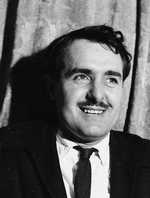Gordon Landsborough
| Gordon Landsborough | |
|---|---|
 |
|
| Born | 1913 Yorkshire, England |
| Died | 1983 |
| Occupation | Writer, publisher |
Gordon Holmes Landsborough, (1913–1983), English publisher, author and bookseller, was in the forefront of change in the paperback publishing and bookselling industries in England during the 1950s to 1980s. Considered a "maverick publishing genius", he was noted for his phenomenal drive and energy, his innovative business ideas and also for his prolific output as an author.
Born in 1913 in Huddersfield, Yorkshire, Gordon Landsborough left school at 14 to help support his family. In the evenings he went to night classes, eventually becoming a chemist with the research department of ICI. Continuing his studies, he turned to journalism and worked on a number of papers and journals in the north of England. In 1938, he started up ARP News, a magazine promoting air raid precautions to a war-nervous England.
He moved to London in 1939, where, among other business ventures, in 1940 he started Reveille, which was originally the official newspaper of the Ex-Services' Allied Association.
In 1940 he joined up with the London Scottish Regiment, serving for a time in the deserts of North Africa. His experiences there provide the material for several of his best selling novels.
In 1949, Gordon Landsborough was hired by publishers Hamilton & Co as production editor for their entire range of books. As part of his contract with Hamilton, he negotiated a deal with them to buy one novel a month from him. He soon made sweeping changes to their lists of science fiction, crime, and romance and expanded them to include foreign legion.
By the start of 1951, Hamilton’s science fiction titles were being published every two weeks and eventually evolved into the science fiction magazine, Authentic Science Fiction. With Landsborough as its first editor, it ran for 85 issues.
Landsborough left Hamilton in mid-1951 to pursue his own career as a writer and publisher. His publishing expertise was much sought after, and he was employed as an advisor to three companies in the paperback publishing industry during the next few years.
His next business venture, in 1953, was an innovation for British publishing: Weekend Novels. Published every Wednesday, they contained a complete and unabridged best selling novel in a 24-page newspaper format with some advertising and were sold for sixpence through newsagents. In these: "He bought reprint rights in existing printed novels and published them each week in tabloid newspaper format without any form of binding or stapling and with line drawings as illustrations... His venture was under-capitalised and had to close after some twenty or so issues had appeared."
...
Wikipedia
